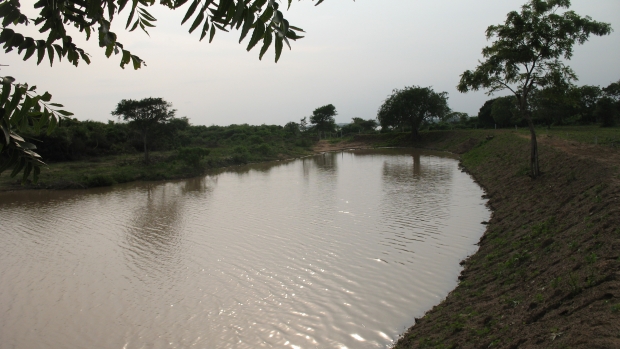Grants :: Small Grant Facilities :: Restoring a village tank
Restoring a village tank

Palugaswewa tank, Sri Lanka © KEkaratne , 2009
Objectives
This project aimed to increase the water supply to Palugaswewa farmers by restoring the local tank (reservoir).
Background
Palugaswewa farm was established in the early 1980s to support 22 low-income fisher families under a national village reawakening scheme. Each family received a plot of 0.4 hectares for rainfed cultivation. The Palugaswewa tank, a reservoir lying next to the farm, offers a potential source of irrigation water for off-season cultivation, but has been unable to play this role because of low rainfall and its dilapidated, silted interior. The Youth Enterprise Information Centre, a local NGO, obtained a small grant from MFF to rehabilitate the tank and increase its water-holding capacity.
Target beneficiaries
Farming families of Palugaswewa.
Outputs
- Restoration of the tank according to relevant local authority guidelines.
- Diversion of a stream to supply the tank with water.
- Increased tank capacity (from 6 to 14 hectare-metres*).
- Enabling of 22 farm families to continue cultivation even during a drought.
- Increased income of farmers from adding a season of cultivation.
Accomplishments and challenges
The tank was cleared of vegetation with the help of the 22 farm families. It was mechanically dredged and its bund strengthened, increasing its capacity from 6 to 14 hectare-metres. A stream that drained rainwater from the forest into the sea was diverted into the restored tank by building an anicut (dam) across it. A supply canal was constructed to bring water from the tank to the farm.
The increased off-season water supply gave the farmers an additional season of cultivation, and allowed the 22 farm families to continue their cultivation during the dry season. The increase in income resulting from these improvements ranged from US$25 to US$175 per farm family.
Contributions to cross-cutting themes
Gender equality
Both men and women were involved in the project and benefited from it through the extra income from increased agricultural production.
Lessons Learned
Success can be gained through technical assistance and knowledge sharing. When working with local communities, it is important to give them responsibility to make their own decisions; respecting these decisions helps to achieve set goals.
Project Facts
Country
Location
Rekawa, Ussangoda and Kalametiya (RUK) area, Sri Lanka
Topic
Duration
1st Oct 2009 to 30th Nov 2009
MFF Grant Amount
US$3,650
Implementing Partner
Youth Enterprise Information Centre
Malpetthawa, Ambalantota,
Sri Lanka
Tel: +94 42 2223658
